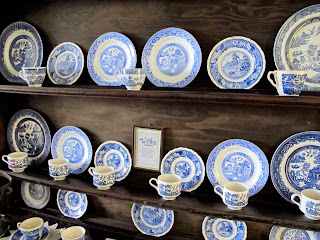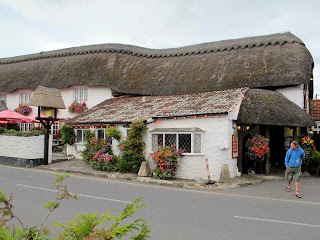The tiny little village of Clovelly is situated in North Devon. It is a private village which has been associated with just three families since the middle of the 13th century, a period of nearly 800 years.
Earlier, at the time of Clovelly’s inclusion in the Domesday Book, it was owned by the King; it enjoyed many royal associations from the 9th century up to 1242, when it was acquired by the Giffard family. The Giffards were of Norman origin, and Walter Giffard came to England as one of Duke William’s closest advisors. Sir Roger Giffard then ‘subinfeuded’ (sublet) the Manor of Clovelly from Walter. The first recorded rector of Clovelly in 1262 was also a Giffard.
The names Staunton and Mandeville appear between 1338 and 1362 thanks to marriage to the Giffard daughters, but by 1370 marriage and purchase brought the ownership of Clovelly to Sir William Cary.
The Carys were one of the great Devon families, cousins of the Grenvilles. Sir William is perhaps best remembered as, reputedly, the builder of the original pier or breakwater – its foundations still rest on massive boulders slotted together rather than being mortared or cemented.
Sir William’s elder brother, Sir John, was a judge and Baron of the Exchequer in 1370, but owing to dynastic intrigues he was banished to Ireland and his lands confiscated.
Sir John’s son, Robert, was brought up in William’s household. His fortunes turned when, at a Royal Tournament in 1413, he defeated the Knight Errant of Aragon who until then had been unconquered throughout Europe. Robert was immediately knighted by Henry V and his father’s lands were restored to him. The Cary arms to this day include the ‘three roses argent’ of the Aragon Knight.
The Carys lived in Clovelly for the next eleven generations. The most remarkable of them are:
William, grandson of Robert, who was captured and beheaded after the Battle of Tewkesbury. There is a head entombed in an unnamed stone coffin under the north aisle of the parish church, and perhaps it belongs to …
William’s son, Robert, who is commemorated by a torso in full armour in the sanctuary of Clovelly Church.
Robert’s grandson, George Cary, completed the quay as we see it today. It cost £2,000, a massive sum in the late 16th century, but this included ‘divers cellars and warehouses’.
George’s son, William, is the ‘Will Cary of Clovelly’ made famous in the novel ‘Westward Ho!’ by Charles Kingsley.
One of William’s sons, George, became Dean of Exeter; evidence of the family’s continuing connections with royalty is his entertainment of the royal family in his deanery.
Although George had seven children, his line died out: his male grandchildren did not marry, and his female grandchildren were childless.
So in 1738 Robert Barber, the widower of Elizabeth Cary, sold Clovelly to Zachary Hamlyn. It is the Hamlyns and their descendants who still own the village and much of the surrounding land.
Zachary Hamlyn, who was born at Kennerland Farm in Higher Clovelly, made his fortune as a lawyer at Lincolns Inn and purchased the estate for £9,438 in 1738. He died unmarried and left the estate to his nephew, James, on condition that he changed his name from Hammett to Hamlyn. James married Arabella Williams, heiress of a Welsh estate, Edwinsford in Carmarthenshire. He was created a baronet for public services.
Their son James (2nd Baronet) married Diana (née Whittaker). Her share of her father's fortune was used to improve the estate, including the construction of the Hobby Drive. Work started during the Napoleonic Wars, assisted, it is said, by French prisoners of war. It and other coast path carriageways were completed in the period of high unemployment after 1815.
The 3rd Baronet, also a James Hamlyn, married Mary, daughter of the 1st Earl Fortescue, another distinguished neighbouring West Country family. They had three daughters. The eldest, Susan Hester, married Henry Fane of Fulbeck, Lincolnshire. The family assumed the surname Hamlyn Fane. Their son, Neville Hamlyn Fane, died in 1884, aged 26. Their daughter, Constance Hamlyn Fane, inherited land at Ringwood, the Avon Tyrrell Estate, and their other daughter, Christine Hamlyn Fane, was given the Clovelly Estate.
In 1889 she married Frederick Gosling. She requested him firstly to change his name from Gosling to Hamlyn because of the long association of the name Hamlyn with Clovelly. Secondly, she asked him to devote his not inconsiderable fortune to the restoration of all properties on the estate. As you walk down the village street you will see many houses inscribed with the initials CH and FH and a date. The dates mark the renovation of the building to meet modern-day standards, but the foundations and outer walls are much older. Christine and Frederick had no children, and the estate was left in 1936 to Christine's niece, Betty Asquith.
Betty Asquith was the daughter of Constance Manners (née Hamlyn Fane) and Lord Manners. Amongst his claims to fame was that he had won a bet that he could in six months buy, train and ride a Grand National winner. This he achieved on Seaman; to this day he remains the only peer to have won the Grand National. Betty's husband, Arthur (son of Herbert Asquith, Prime Minister from 1908 to 1916), was a distinguished and brave volunteer soldier in the First World War. He reached the rank of Brigadier General, and was awarded the DSO and two bars. He returned to a business career after the war, but died prematurely in 1939.
Betty and Arthur had four daughters. Mary, the eldest, married Keith Rous from the Henham Estate in Suffolk in 1943. She inherited the Clovelly Estate on Betty's death in 1962. Her son, John Rous, took over the running of the estate in 1983.
(All information c/o Clovelly brochures & website.)
The countryside area around the Devon Valley
The Thatch pub for our daily pint and pork scratchings. What a treat and just look at this pub from the 14th century. Dru's head was able to touch the ceiling standing straight up. I can just imagine back in the fourteenth century people must of been really short or they had serious issues when they had too many pints to walk out of the pub without a good bang on the head.
Not a bad idea as then the headache is even worse the next day, could out you off pints for life:)
Winding very narrow roads through the countryside. Who knew there is so much greenery in England.










































No comments:
Post a Comment